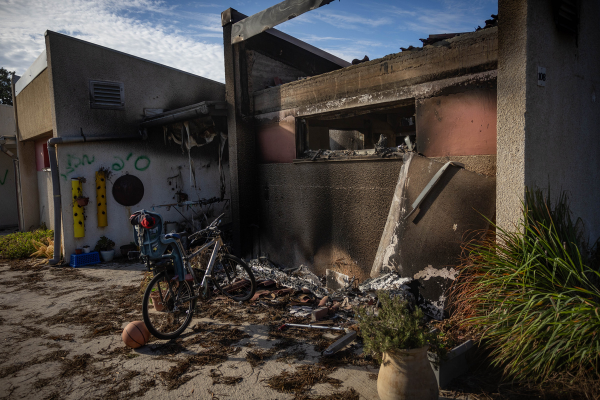‘Our identity is now once again linked to pain, loss, and tragedy that makes Tisha B’Av one of deeper meaning.’
By Shula Rosen
A 2,000-year-old day of mourning for the destruction of the Holy Temple in Jerusalem carries new relevance for Israelis and Jews around the world in the wake of the October 7th massacre.
Adam Hajaj, whose cousin Rom Braslavski was kidnapped from the Supernova festival by Hamas terrorists, said during a rally in support of hostages that Tisha B’Av, the day of mourning for the Temple, resonated with his experience.
At a hostage rally in Tel Aviv, Hajaj said, “I want to talk to you about the destruction of the Second Temple.”
He added that it “feels much closer to home and relevant” to read the biblical Book of Lamentations, known in Hebrew as Eicha.
Eicha is a book of the Hebrew Bible read on the 9th of Av, which falls on the evening of Monday and throughout Tuesday, August 12 and 13 this year.
During this day of mourning, Jews fast, sit on the floor, and read Eicha in synagogues.
The book’s theme is destruction, with brief glimmers of hope that imply the negative prophecies need not come to pass.
Hajaj said that Jews once again face a choice of “Unity, mutual assistance, courage — or another destruction by violence and hatred.”
Eicha and the day of mourning itself comes at a time when Israel is still experiencing the effects of October 7th, 2023, the bloodiest day for Jews since the Holocaust, with a war still raging and threatening to open on multiple fronts, hostages still held in Gaza and efforts to release them still elusive, and overt threats of destruction from Iran and Hezbollah.
In the wake of October 7th, dozens of kinot, or liturgical poems in the spirit of Lamentations, have been composed in Jewish communities.
Rabbi David Stav, who heads the Tzohar rabbinical group, says, “Our identity is now once again linked to pain, loss, and tragedy that makes Tisha B’Av one of deeper meaning, prayer, and purpose to both mourn and inspire change.”
Stav added that envisions October 7th entering Judaism’s canon, and this year Tzohar’s kinot and others are being read in many communities in addition to the traditional kinot and Eicha.
Tzohar published a 24-page booklet with kinot connected to October 7.
In addition, Rabbi Yosef Zvi Rimon, the president of the World Mizrachi Movement, published a “Kinah for the Events of Swords of Iron,” the army’s codename for the ongoing war on Hamas.
In Tzohar’s kinot, The Lament of Be’eri.” An original poem by musician Yagel Haroush, ends with the line: “Let us water Be’eri from the well of our tears.”
Stav said October 7th ended a “Golden Era” Israel and the world Jewish community seemed to have been experiencing.
He added in the period immediately preceding the atrocities of October 7th, it was “difficult to really relate to past tragedies in any tangible and emotional way” collective days of mourning.
However, in just hours, “October 7 changed that entire conception,” Stav concluded.
Join Six Million United Against Antisemitism!
We stand united against antisemitism and pledge to fight hatred and violence against the Jewish people and its institutions around the world.
Sign the petition - Declare 'Never Again is Now'!
ANTISEMITISM IS SURGING, THREATENING JEWISH LIVES!



